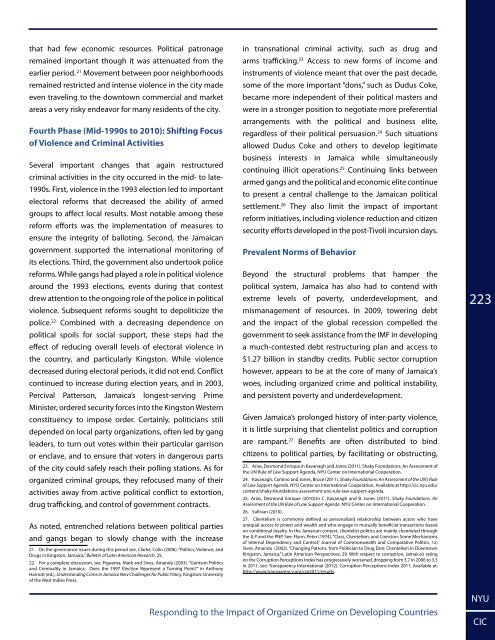Jamaica - Center on International Cooperation
Jamaica - Center on International Cooperation
Jamaica - Center on International Cooperation
Create successful ePaper yourself
Turn your PDF publications into a flip-book with our unique Google optimized e-Paper software.
that had few ec<strong>on</strong>omic resources. Political patr<strong>on</strong>age<br />
remained important though it was attenuated from the<br />
earlier period. 21 Movement between poor neighborhoods<br />
remained restricted and intense violence in the city made<br />
even traveling to the downtown commercial and market<br />
areas a very risky endeavor for many residents of the city.<br />
Fourth Phase (Mid-1990s to 2010): Shifting Focus<br />
of Violence and Criminal Activities<br />
Several important changes that again restructured<br />
criminal activities in the city occurred in the mid- to late-<br />
1990s. First, violence in the 1993 electi<strong>on</strong> led to important<br />
electoral reforms that decreased the ability of armed<br />
groups to affect local results. Most notable am<strong>on</strong>g these<br />
reform efforts was the implementati<strong>on</strong> of measures to<br />
ensure the integrity of balloting. Sec<strong>on</strong>d, the <str<strong>on</strong>g>Jamaica</str<strong>on</strong>g>n<br />
government supported the internati<strong>on</strong>al m<strong>on</strong>itoring of<br />
its electi<strong>on</strong>s. Third, the government also undertook police<br />
reforms. While gangs had played a role in political violence<br />
around the 1993 electi<strong>on</strong>s, events during that c<strong>on</strong>test<br />
drew attenti<strong>on</strong> to the <strong>on</strong>going role of the police in political<br />
violence. Subsequent reforms sought to depoliticize the<br />
police. 22 Combined with a decreasing dependence <strong>on</strong><br />
political spoils for social support, these steps had the<br />
effect of reducing overall levels of electoral violence in<br />
the country, and particularly Kingst<strong>on</strong>. While violence<br />
decreased during electoral periods, it did not end. C<strong>on</strong>flict<br />
c<strong>on</strong>tinued to increase during electi<strong>on</strong> years, and in 2003,<br />
Percival Patters<strong>on</strong>, <str<strong>on</strong>g>Jamaica</str<strong>on</strong>g>’s l<strong>on</strong>gest-serving Prime<br />
Minister, ordered security forces into the Kingst<strong>on</strong> Western<br />
c<strong>on</strong>stituency to impose order. Certainly, politicians still<br />
depended <strong>on</strong> local party organizati<strong>on</strong>s, often led by gang<br />
leaders, to turn out votes within their particular garris<strong>on</strong><br />
or enclave, and to ensure that voters in dangerous parts<br />
of the city could safely reach their polling stati<strong>on</strong>s. As for<br />
organized criminal groups, they refocused many of their<br />
activities away from active political c<strong>on</strong>flict to extorti<strong>on</strong>,<br />
drug trafficking, and c<strong>on</strong>trol of government c<strong>on</strong>tracts.<br />
As noted, entrenched relati<strong>on</strong>s between political parties<br />
and gangs began to slowly change with the increase<br />
21. On the governance issues during this period see, Clarke, Colin (2006). “Politics, Violence, and<br />
Drugs in Kingst<strong>on</strong>, <str<strong>on</strong>g>Jamaica</str<strong>on</strong>g>,” Bulletin of Latin American Research, 25.<br />
22. For a complete discussi<strong>on</strong>, see: Figueroa, Mark and Sives, Amanda (2003). “Garris<strong>on</strong> Politics<br />
and Criminality in <str<strong>on</strong>g>Jamaica</str<strong>on</strong>g>: Does the 1997 Electi<strong>on</strong> Represent a Turning Point?” in Anth<strong>on</strong>y<br />
Harriott (ed.), Understanding Crime in <str<strong>on</strong>g>Jamaica</str<strong>on</strong>g> New Challenges for Public Policy. Kingst<strong>on</strong>: University<br />
of the West Indies Press.<br />
in transnati<strong>on</strong>al criminal activity, such as drug and<br />
arms trafficking. 23 Access to new forms of income and<br />
instruments of violence meant that over the past decade,<br />
some of the more important “d<strong>on</strong>s,” such as Dudus Coke,<br />
became more independent of their political masters and<br />
were in a str<strong>on</strong>ger positi<strong>on</strong> to negotiate more preferential<br />
arrangements with the political and business elite,<br />
regardless of their political persuasi<strong>on</strong>. 24 Such situati<strong>on</strong>s<br />
allowed Dudus Coke and others to develop legitimate<br />
business interests in <str<strong>on</strong>g>Jamaica</str<strong>on</strong>g> while simultaneously<br />
c<strong>on</strong>tinuing illicit operati<strong>on</strong>s. 25 C<strong>on</strong>tinuing links between<br />
armed gangs and the political and ec<strong>on</strong>omic elite c<strong>on</strong>tinue<br />
to present a central challenge to the <str<strong>on</strong>g>Jamaica</str<strong>on</strong>g>n political<br />
settlement. 26 They also limit the impact of important<br />
reform initiatives, including violence reducti<strong>on</strong> and citizen<br />
security efforts developed in the post-Tivoli incursi<strong>on</strong> days.<br />
Prevalent Norms of Behavior<br />
Bey<strong>on</strong>d the structural problems that hamper the<br />
political system, <str<strong>on</strong>g>Jamaica</str<strong>on</strong>g> has also had to c<strong>on</strong>tend with<br />
extreme levels of poverty, underdevelopment, and<br />
mismanagement of resources. In 2009, towering debt<br />
and the impact of the global recessi<strong>on</strong> compelled the<br />
government to seek assistance from the IMF in developing<br />
a much-c<strong>on</strong>tested debt restructuring plan and access to<br />
$1.27 billi<strong>on</strong> in standby credits. Public sector corrupti<strong>on</strong><br />
however, appears to be at the core of many of <str<strong>on</strong>g>Jamaica</str<strong>on</strong>g>’s<br />
woes, including organized crime and political instability,<br />
and persistent poverty and underdevelopment.<br />
Given <str<strong>on</strong>g>Jamaica</str<strong>on</strong>g>’s prol<strong>on</strong>ged history of inter-party violence,<br />
it is little surprising that clientelist politics and corrupti<strong>on</strong><br />
are rampant. 27 Benefits are often distributed to bind<br />
citizens to political parties, by facilitating or obstructing,<br />
23. Arias, Desm<strong>on</strong>d Enrique in Kavanagh and J<strong>on</strong>es (2011), Shaky Foundati<strong>on</strong>s, An Assessment of<br />
the UN Rule of Law Support Agenda, NYU <str<strong>on</strong>g>Center</str<strong>on</strong>g> <strong>on</strong> Internati<strong>on</strong>al Cooperati<strong>on</strong>.<br />
24. Kavanagh, Camino and J<strong>on</strong>es, Bruce (2011). Shaky Foundati<strong>on</strong>s: An Assessment of the UN’s Rule<br />
of Law Support Agenda. NYU <str<strong>on</strong>g>Center</str<strong>on</strong>g> <strong>on</strong> Internati<strong>on</strong>al Cooperati<strong>on</strong>. Available at http://cic.nyu.edu/<br />
c<strong>on</strong>tent/shaky-foundati<strong>on</strong>s-assessment-uns-rule-law-support-agenda.<br />
25. Arias, Desm<strong>on</strong>d Enrique (2010).In C. Kavanagh and B. J<strong>on</strong>es (2011). Shaky Foundati<strong>on</strong>s, An<br />
Assessment of the UN Rule of Law Support Agenda. NYU <str<strong>on</strong>g>Center</str<strong>on</strong>g> <strong>on</strong> Internati<strong>on</strong>al Cooperati<strong>on</strong>.<br />
26. Sullivan (2010).<br />
27. Clientelism is comm<strong>on</strong>ly defined as pers<strong>on</strong>alized relati<strong>on</strong>ship between actors who have<br />
unequal access to power and wealth and who engage in mutually beneficial transacti<strong>on</strong>s based<br />
<strong>on</strong> c<strong>on</strong>diti<strong>on</strong>al loyalty. In the <str<strong>on</strong>g>Jamaica</str<strong>on</strong>g>n c<strong>on</strong>text, clientelist politics are mainly channeled through<br />
the JLP and the PNP. See: Flynn, Peter (1974). “Class, Clientelism, and Coerci<strong>on</strong>: Some Mechanisms<br />
of Internal Dependency and C<strong>on</strong>trol,” Journal of Comm<strong>on</strong>wealth and Comparative Politics, 12;<br />
Sives, Amanda (2002). “Changing Patr<strong>on</strong>s, from Politician to Drug D<strong>on</strong>: Clientelism in Downtown<br />
Kingst<strong>on</strong>, <str<strong>on</strong>g>Jamaica</str<strong>on</strong>g>,” Latin American Perspectives, 29. With respect to corrupti<strong>on</strong>, <str<strong>on</strong>g>Jamaica</str<strong>on</strong>g>’s rating<br />
<strong>on</strong> the Corrupti<strong>on</strong> Percepti<strong>on</strong>s Index has progressively worsened, dropping from 3.7 in 2006 to 3.3<br />
in 2011, see: Transparency Internati<strong>on</strong>al (2012). Corrupti<strong>on</strong> Percepti<strong>on</strong>s Index 2011, Available at:<br />
http://www.transparency.org/cpi2011/results.<br />
223<br />
Resp<strong>on</strong>ding to the Impact of Organized Crime <strong>on</strong> Developing Countries<br />
NYU<br />
CIC
















